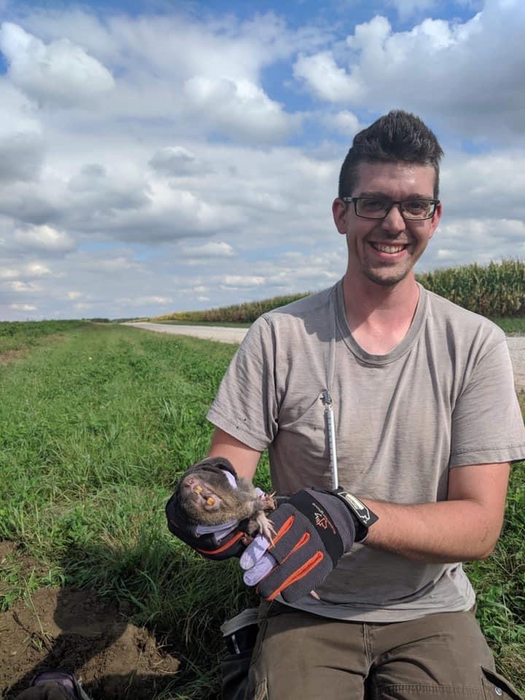URBANA, Ill. – People from marginalized gender and sexual identities can have safer experiences participating in ecological field research when leaders incorporate better field safety protocols and advocate for systemic changes, according to a new paper authored by scientists from Earlham College, the University of Illinois Urbana-Champaign (UIUC), and other institutions.

Credit: Nathan Alexander, University of Illinois
URBANA, Ill. – People from marginalized gender and sexual identities can have safer experiences participating in ecological field research when leaders incorporate better field safety protocols and advocate for systemic changes, according to a new paper authored by scientists from Earlham College, the University of Illinois Urbana-Champaign (UIUC), and other institutions.
The paper, published in the Journal of Applied Ecology, offers best practices for LGBTQ+ inclusion based on evidence-based strategies currently in use by the authors. The paper also underscores the role of systematic inclusion in attracting and retaining a qualified, richly diverse workforce.
“Institutions of higher education and mentors want to make progress on LGBTQ+ inclusion but they often don’t know where to start,” says Jaime Coon, an assistant professor of biology and environmental sustainability at Earlham and a lead author on the paper. “Our aim was to create actionable recommendations based on stories from an author team with diverse experiences and identities.” Coon completed her doctoral program in the Department of Natural Resources and Environmental Sciences (NRES), part of the College of Agricultural, Consumer and Environmental Sciences (ACES) at UIUC.
The authors draw on their own stories of marginalization to reveal a greater risk of harassment, discrimination, and violence for LGBTQ+ people, especially in rural or remote fieldwork situations. Marginalized gender and sexual identities also face social, physical, and emotional barriers to safety and inclusion in the context of fieldwork. Assigning individuals to gendered bunkhouses or excluding LGBTQ+ individuals from shared housing are just a few examples.
Nathan Alexander, the study’s other lead author and doctoral student in NRES, adds, “An important aspect of this paper is that we approach advocacy and inclusion at structural and interpersonal levels, and we provide personal resiliency strategies for LGBTQ+ field researchers. Often, LGBTQ+ advocacy focuses on interpersonal actions (e.g., using correct pronouns) but fails to acknowledge structural barriers that may prohibit access.”
The authors call for cis/heterosexual mentors and peers to actively learn about the challenges LGBTQ+ people face, and to promote a welcoming, supportive atmosphere that challenges the standard of cis/heteronormativity: the assumption that everyone is straight or identifies with their gender assigned at birth.
Regarding institutional change, the authors recommend creating comprehensive fieldwork protocols, safety plans, gender-inclusive housing and bathroom policies, and ensuring medical insurance includes gender-affirming healthcare.
“During my teaching assistantships over the years, I’ve had students ask if they had to change to a different major because they were gay; I’ve had students come out to me; and I’ve been privileged to provide guidance and support to individual students. However, having a mentor is not a guarantee. We hoped to provide information on not only finding mentors or an LGBTQ+ fieldwork community, but also some practical suggestions and affirmation of belonging to anyone that may be isolated,” Alexander says.
In addition to community-building advice for mentors – for example, planning a Pride Month celebration – the paper includes individual resilience strategies for LGBTQ+ field ecologists. These include being aware of safety risks and finding ways to stay connected to LGBTQ+ communities, such as bringing a personal, subtle symbol of LGBTQ+ identity like a special book or photo. Remaining connected to community is critical, the authors note, because fieldwork often takes place in isolated locations that may lack LGBTQ+-friendly resources.
While the paper was written primarily with ecological fieldwork in mind, the recommendations are broadly applicable to anyone interested in LGBTQ+ inclusion work.
“This isn’t just about making institutions of higher education a better place. This is about making everywhere a better place,” Coon said. “LGBTQ+ folks are more likely to experience homelessness. They are more likely to experience harassment and victimization in their day-to-day lives. We wanted to bring these societal conversations to the forefront as a part of LGBTQ+ inclusion within field ecology.”
The paper, “Best practices for LGBTQ+ inclusion in ecological fieldwork,” is published in the Journal of Applied Ecology [DOI: 10.1111/1365-2664.14339]. Authors include Coon, Alexander, Emmett Smith, Madeleine Spellman, Isaac Klimasmith, Lucas Allen-Custodio, Thea Clarkberg, Douglas Knutson, Kae Fountain, Michael Rivera, Maxine Scherz, and Leslie Morrow.
Journal
Journal of Applied Ecology
DOI
10.1111/1365-2664.14339




